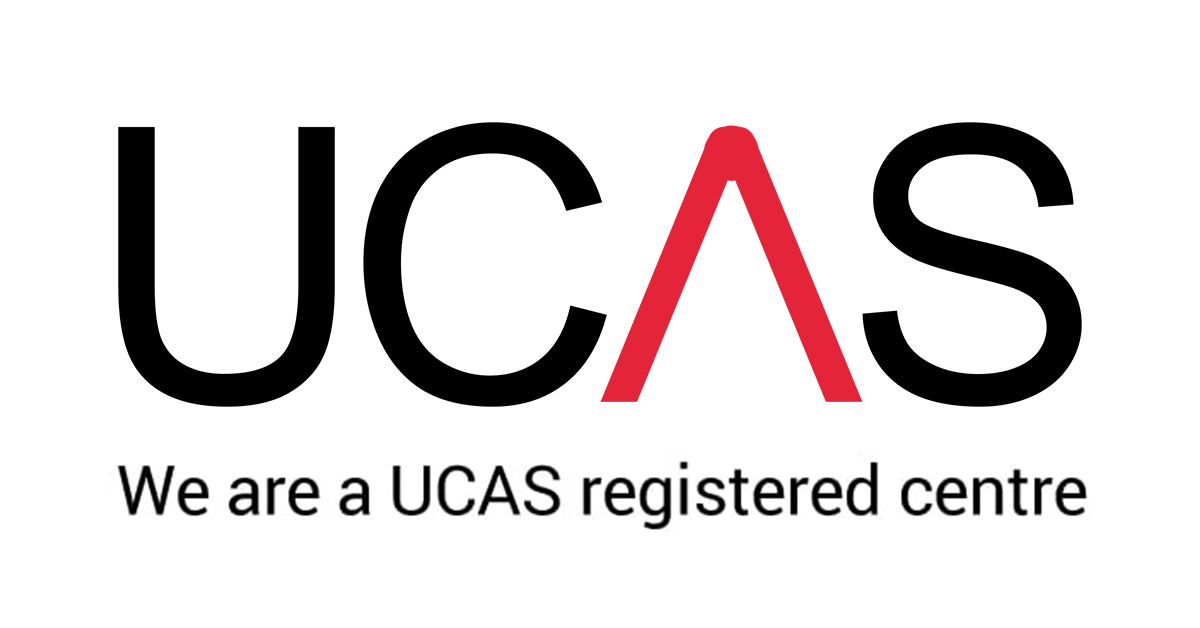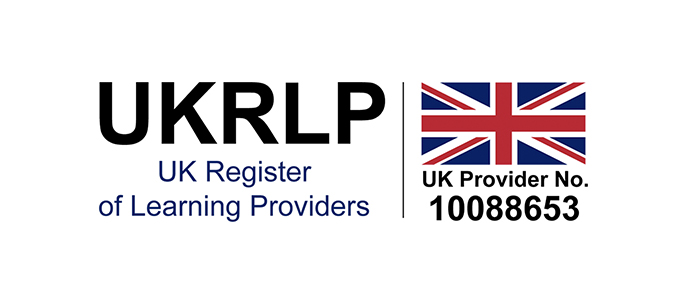That quiet but persistent feeling that mainstream school just isn't working for your child? That’s where the journey to home education so often begins. It's that powerful, parental instinct whispering that your child needs something different—a path that honours their unique spirit and emotional wellbeing above standardised tests and the school bell's rigid rhythm. This isn’t just about changing where they learn; it's about choosing to give them the freedom to flourish.
Is Home Education the Right Path for Your Child?
Deciding to home educate is a deeply personal choice, usually born from a desire to put a child's emotional and intellectual needs front and centre. It's a path taken by families who see a fundamental mismatch between their child and the school system, whether that’s due to the pain of bullying, unmet special educational needs (SEN), or simply the powerful belief that learning should be a joyful, curiosity-driven adventure, not a source of anxiety.
And it’s a feeling that’s becoming more and more common across the UK. In the 2023/24 academic year, over 153,300 children were being electively home-educated. The reasons are profoundly child-centric: 14% of families are motivated by mental health concerns, while another 13% cite dissatisfaction with the support offered by schools. It all builds a powerful case for creating a more personalised, nurturing environment where a child can truly feel safe and seen.
At a Glance: Comparing Mainstream School vs Home Education
To really grasp the emotional shift, it helps to see the two approaches side-by-side. The table below breaks down the core differences between the structured world of state schooling and the flexible, heart-led nature of home education.
| Aspect | Mainstream Schooling | Home Education |
|---|---|---|
| Curriculum | Must follow the National Curriculum. | No legal requirement to follow the National Curriculum. |
| Schedule | Rigid timetable set by the school (e.g., 9 am to 3 pm). | Flexible; learning can follow your child's natural rhythm. |
| Pace of Learning | Set by the class average; children must keep up or feel left behind. | Tailored to the child's individual pace and emotional needs. |
| Subjects | Compulsory subjects for all students. | Subjects are chosen based on what truly fascinates your child. |
| Environment | Classroom-based with a large peer group. | The world is your classroom (home, outdoors, museums). |
| Assessment | Formal tests and exams (e.g., SATs, GCSEs). | Assessment is gentle and ongoing; formal exams are optional. |
This comparison highlights the fundamental trade-off: swapping the prescribed structure of school for the freedom to build an education that truly fits your child, respecting their unique mind and spirit.
The Freedom From the National Curriculum
Perhaps the single most liberating aspect of home education in the UK is this: you are not required to follow the National Curriculum. This fact alone opens up a world of possibilities, taking the pressure off and letting you breathe. Instead of being tied to fixed subjects and government-mandated schedules, you have the legal right and freedom to design a bespoke education that genuinely works for your child.
Think about the relief on the face of a child who feels crushed by classroom maths when they suddenly thrive by learning fractions while baking a cake for their grandad. Imagine the spark in the eyes of a child who finds history lectures painfully dull but develops a deep passion for the past by visiting a real castle, touching the cold stone walls, and imagining the lives lived within them.
This approach gives you the power to:
- Follow their passions: If your child adores dinosaurs, you can build an entire curriculum around it, covering palaeontology (science), creative writing (English), and measuring fossil sizes (maths).
- Support their wellbeing: You can craft a calm, safe environment, free from the social pressures and anxieties that school can trigger, allowing them to learn without fear.
- Align with your family's values: Your child’s education can be built around what matters most to you, whether that’s kindness, nature, faith, travel, or community service.
The image below really brings home the difference in structure between school and home education, illustrating the move away from compulsory subjects towards limitless flexibility.
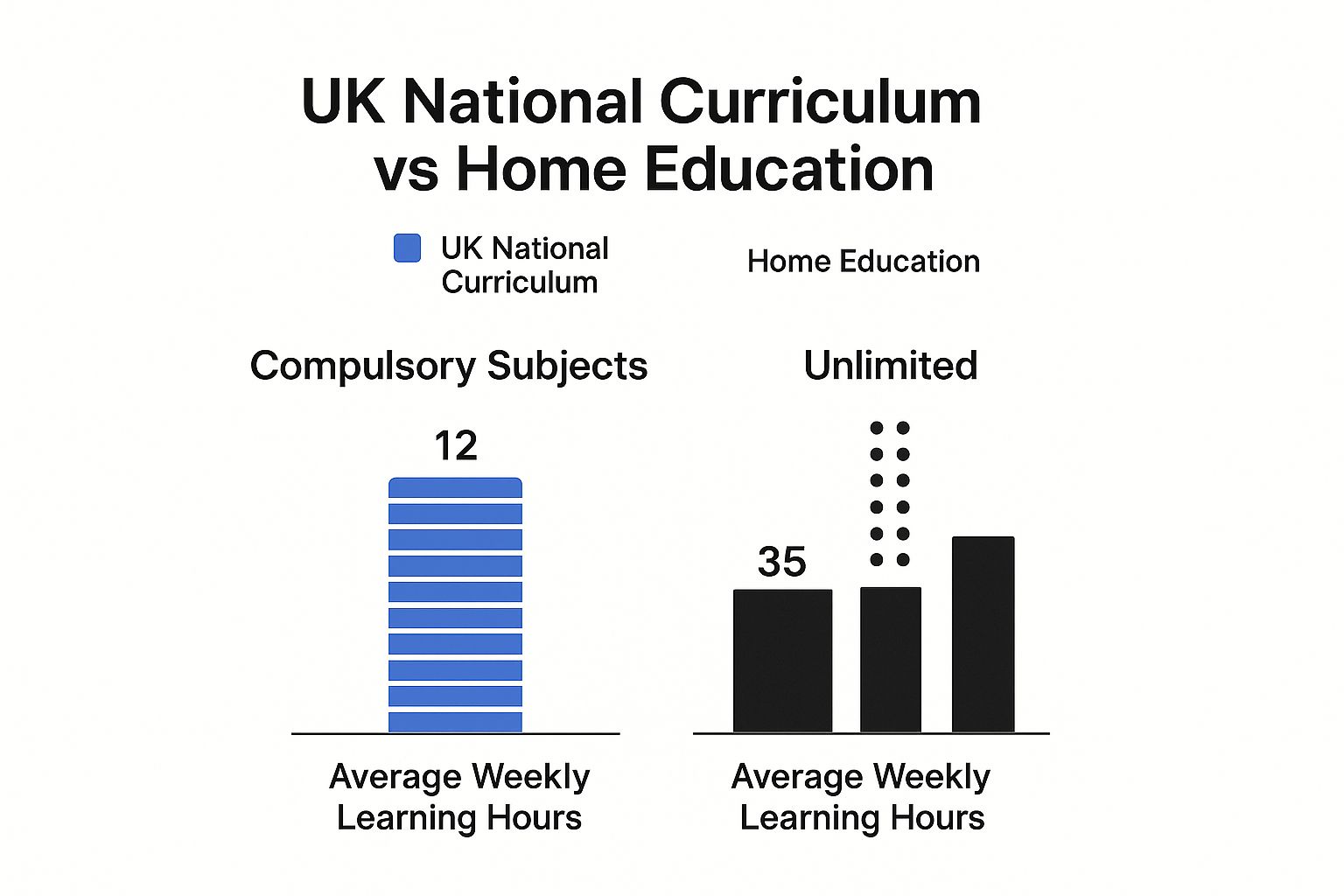
This visual contrast gets to the heart of home education's core benefit: it replaces standardised requirements with child-led exploration. Ultimately, the many advantages of homeschooling spring from this incredible ability to create a learning journey that honours your child for who they truly are.
Understanding Your Legal Rights and Responsibilities
Stepping into home education can feel like you’re trying to decode a secret language, especially when it comes to the law. The mere thought of dealing with the Local Authority (LA) is enough to spark a little anxiety, but here’s the thing: your rights are much clearer and stronger than you might imagine. The law is there to protect a child's right to an education, not to police how you choose to provide it with love and care.
At its heart, UK law is beautifully straightforward. Section 7 of the 1996 Education Act simply says that it’s a parent’s duty to make sure their child gets an “efficient full-time education suitable to his age, ability and aptitude.” The magic words there are ‘suitable’ and ‘efficient’, and they give you an incredible amount of freedom to do what's right for your child.
Deregistering Your Child From School
If your child is currently at a mainstream school (this doesn't apply to special schools, which have different rules), taking them out is surprisingly simple. All you need to do is write a formal letter to the headteacher stating that you’re going to home educate. You don’t need to ask for their permission or justify your decision. It’s a notification, not a request.
Once your letter is received, the school is legally required to take your child’s name off the register and let the Local Authority know. That's it. You've officially begun your journey.
Practical Example: The Deregistration Letter
Keep your letter short, polite, and to the point. This is you calmly and confidently taking control of your child's future.
Dear [Headteacher's Name],
Re: [Child's Full Name], [Date of Birth]
I am writing to inform you that I am withdrawing my child, [Child's Name], from the school roll with immediate effect as I have decided to take full responsibility for their education at home.
Please remove [Child's Name] from the school register in accordance with Education (Pupil Registration) (England) Regulations 2006, Regulation 8(1)(d).
Yours sincerely,
[Your Name]
This formal step is often the most emotional one. It's the moment you officially take the reins, shifting from a school-led system to a path led by your child's needs and interests. For a deeper look at this process, our guide on how to homeschool in the UK walks you through the finer details.
Communicating With The Local Authority
After you’ve deregistered, the LA will probably get in touch to make ‘informal enquiries’ about your educational plans. It’s so important to remember that you are in control of this conversation. You are not required to allow home visits, submit school-style lesson plans, or present evidence that mimics a classroom.
Your only responsibility is to show that a suitable education is happening—one that nurtures your child's growth. This can be done in plenty of ways that respect your family’s privacy and your child's unique way of learning.
- Share your educational philosophy: A short, heartfelt report explaining your approach, the resources you’re using, and your focus on your child's wellbeing is often enough.
- Show examples of their work: This doesn’t have to be worksheets! A photo of your child proudly holding a cake they baked (maths!), a drawing inspired by a nature walk (art and science!), or a story they dictated to you can paint a brilliant picture of their learning.
- Focus on your child’s wellbeing: Talk about how your home education UK curriculum is specifically built around their passions, mental health, and confidence. Explain why this approach is right for them.
Imagine your child is obsessed with animals. Your report to the LA could describe how you're exploring science through visits to a nature reserve, English by writing stories about their favourite creature, and maths by working out the costs of keeping a pet. This is a powerful, real-world example of a suitable and efficient education, completely centred on what lights your child up.
Designing a Curriculum Around Your Child
This is where the real magic of home education truly begins. You’re not just picking a new place for your child to learn; you’re being handed a blank canvas to create an education that fits them like a glove. Instead of trying to squeeze their unique personality into a pre-made system, you get to build a whole world of learning around their natural curiosity, passions, and spirit.
The goal isn't to replicate school at the kitchen table. It's to throw the rulebook away and ask a much more powerful question: "What truly lights my child up?" The answer to that question becomes the very foundation of your home education UK curriculum.
Discovering Your Child’s Learning Style
Before you even think about specific subjects, just take a step back and observe. How does your child naturally interact with the world around them? Figuring out their innate learning style is the first, and most important, step in crafting an education that feels joyful rather than forced.
Every child learns differently, and recognising their unique approach is central to creating a supportive environment. For a deeper look into this tailored approach, you can learn more about what is differentiated learning and how it helps meet individual student needs.
-
The Kinesthetic Learner (The Doer): Does your child need to move to think? They learn best through physical activity, building things with their hands, and getting stuck into real-world experiments. A worksheet on fractions will probably fall flat, but letting them measure ingredients for a cake makes the concept click instantly.
-
The Visual Learner (The Watcher): This child absorbs information through what they see. They adore diagrams, colourful books, and watching how things are done. For them, a captivating documentary on ancient Rome will be far more engaging than just reading a chapter in a history book.
-
The Auditory Learner (The Listener): Is your child all about stories, music, and conversations? They learn by hearing. Reading aloud, discussing big ideas, and using audiobooks or podcasts can make any subject come alive for them.
-
The Reading/Writing Learner (The Scribe): This child thrives on the written word. They love making lists, taking notes, and diving headfirst into books. A trip to the library is their version of a grand adventure, a chance to explore whole new worlds.
Once you identify their primary style, you can stop fighting against their nature and start working with it, bringing a sense of ease and flow to your days.
Exploring Educational Philosophies
The good news is you don't have to invent your entire approach from scratch. Many inspiring educational philosophies can provide a fantastic framework for your journey. Think of them less as rigid sets of rules and more as guiding principles you can adapt to fit your family's unique values and your child's spirit.
The beauty of home education is that you get to pick and choose. You might love the nature-focus of one philosophy and the project-based ideas of another. Your curriculum can be a beautiful, bespoke blend that is entirely your own.
When designing a curriculum tailored to your child, exploring various educational philosophies, such as discovery-based learning principles, can be incredibly insightful. This approach is all about allowing children to find answers to their own questions through exploration and hands-on activities.
Let’s look at a few popular styles:
- The Charlotte Mason Method: This gentle, soulful philosophy is built around "living books" (beautifully written narrative books instead of dry textbooks), nature study, and short, focused lessons. It’s all about creating a rich learning atmosphere that feeds a child's soul as well as their mind.
- Unschooling: This is the ultimate child-led approach. Learning isn't separated into subjects but happens organically through the rhythm of everyday life. The parent’s role is to facilitate their child's interests, providing resources and opportunities as they arise, trusting their child's innate curiosity.
- Project-Based Learning: Here, learning is organised around deep-dive projects. A child's fascination with space could easily become a multi-week project that incorporates science (building a model solar system), maths (calculating distances between planets), and English (writing a brilliant sci-fi story).
Weaving Passions into Learning
Now, let's put it all together. Here are a couple of practical examples that put the child right at the centre of their own education, turning learning into a joyful extension of who they are.
Example 1: The Nature-Lover
Imagine you have an 8-year-old who is happiest when they're outdoors. A traditional, desk-based curriculum might feel suffocating to their spirit. Instead, you could build their learning around their passion:
- Science: Start a nature journal to document local birds, insects, and plants. This instantly becomes a hands-on biology lesson filled with wonder.
- Art: Use leaves, twigs, and mud to create natural sculptures or paintings, connecting them to the earth.
- Maths: Measure the growth of a sunflower you planted together, or calculate the area of your garden patch, making numbers feel real and purposeful.
Example 2: The Video Game Enthusiast
For the 12-year-old who adores video games, their passion is a gateway, not a distraction.
- English: Encourage them to write their own game narrative or create a blog reviewing their favourite games, giving them a real audience for their writing.
- IT & Coding: Use platforms like Scratch or Code.org to have a go at designing their own simple game, empowering them as a creator, not just a consumer.
- History: Explore the historical settings of games like Assassin's Creed, sparking a genuine interest in different time periods and cultures.
This is the heart of bespoke home education. It's about seeing the educational potential in absolutely everything and trusting that when a child is genuinely engaged, the learning is deeper, more meaningful, and will last a lifetime.
Bringing Core Subjects to Life Without Textbooks
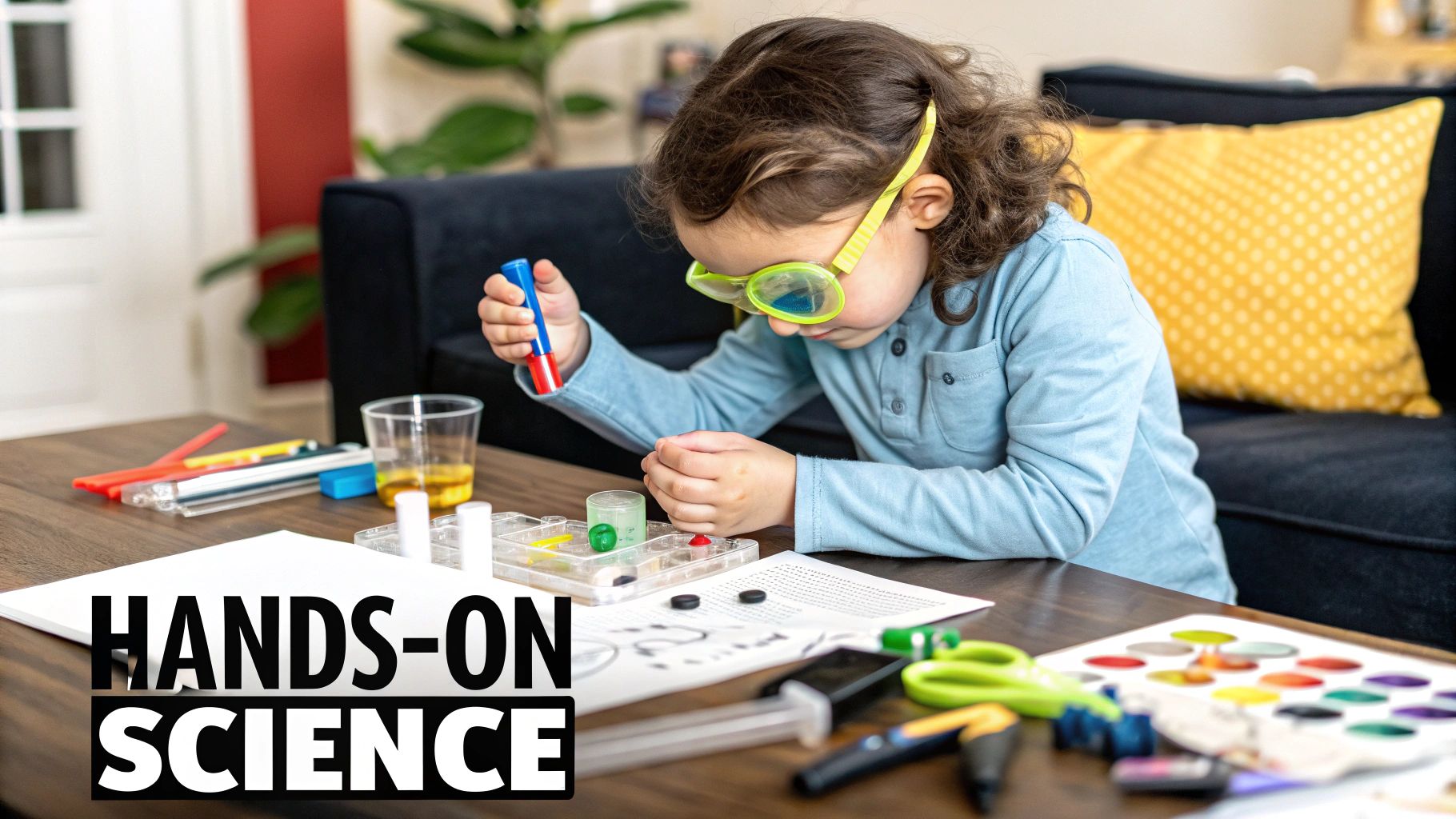
The idea of teaching core subjects can feel a bit daunting. How on earth do you cover maths without a stack of worksheets, or teach English without formal essays and grammar drills? The beautiful truth is that the most profound learning often happens far from a textbook, woven right into the fabric of everyday life.
It's all about shifting your perspective—seeing the garden as a science lab, the kitchen as a maths classroom, and a trip to the shops as a lesson in economics. This is about nurturing a genuine love for learning, not just ticking off subjects from a list. When you connect learning to your child's world, you move beyond rote memorisation and into deep, lasting understanding.
This feeling is being echoed all over the country as more families search for a more authentic way to measure progress. In fact, 62% of parents now feel that conventional assessments fail to capture a child's true capabilities. It’s a feeling shared by the 84% of UK teachers who support alternative, simulation-based exams. This growing desire for a more holistic approach is at the very heart of creating a personalised home education UK curriculum.
Igniting a Passion for English with Living Stories
Forget dry comprehension exercises. The real goal is to raise a child who loves language, who sees words as tools for connection, creativity, and self-expression. You can do this by filling your home with what the pioneering educator Charlotte Mason called "living books."
These aren't textbooks stuffed with facts, but rich, beautifully written stories that spark the imagination and stir emotion. A captivating historical novel can teach more about a time period than any list of dates ever could, while a powerful biography can inspire a child in ways a simple summary never will.
- Read Aloud Together: Even for older children, sharing a story aloud builds connection and models expressive reading. Cuddled up on the sofa with a book, it turns literature into a shared, treasured experience.
- Start a Blog: If your child loves gaming or has a particular hobby, encourage them to start a blog. They'll learn about writing for an audience and editing their own work, all while writing about something they adore.
- Write Letters: Connecting with a pen pal or writing to relatives brings real purpose to writing. It's a genuine reason to practise spelling, grammar, and the beautiful art of communication.
Discovering Maths in the Everyday
For so many children, maths becomes a source of anxiety because it feels abstract and totally disconnected from their lives. The key is to show them that maths is everywhere—a practical tool they're already using every single day.
When a child measures flour for a cake, they aren't 'doing a maths problem'; they are baking. When they save up their pocket money for something they desperately want, they aren't 'studying finance'; they are achieving a goal. The learning is embedded in the purpose and the feeling of accomplishment.
Here’s how you can make maths tangible and meaningful:
- Baking and Cooking: The kitchen is a goldmine for fractions, measurements, conversions, and sequencing. Doubling a recipe or halving it provides an immediate, delicious lesson in multiplication and division.
- Managing Pocket Money: Budgeting, calculating discounts in shops, and working out savings goals are powerful, real-life lessons in percentages and financial literacy that build confidence and independence.
- Board Games and Card Games: So many games are brilliant for developing number sense, strategic thinking, and quick mental arithmetic without any of the pressure of a formal test. It's learning through laughter and play.
Exploring Science Through Curiosity and Wonder
Science isn't just a collection of facts and formulas; it's a way of looking at the world with curiosity and asking "why?" and "how?" You don't need a fancy laboratory to foster a scientific mind. All you really need is a willingness to wonder and explore right alongside your child.
To get science feeling like exciting play rather than a chore, exploring a parent's guide to learning STEM toys can be a fantastic starting point.
Practical Example: A Garden Investigation
Your own back garden or a local park can become your primary science classroom.
- Observation: Start by simply looking. What creatures live under that rock? How does a plant change over a week? This teaches careful observation, the foundation of all scientific inquiry, and a deep appreciation for the small wonders of the world.
- Experimentation: Plant two of the same seeds in different spots—one in the sun, one in the shade. This simple act teaches the concept of a "fair test" as you compare their growth, making science a hands-on discovery.
- Citizen Science: Take part in national projects like the RSPB's Big Garden Birdwatch. Your child can contribute real data to actual scientific studies, making them feel like a genuine part of the scientific community.
By framing core subjects this way, you show your child that learning isn't a task confined to specific hours. It's a natural, exciting part of being alive.
Finding Your Community and Essential Resources
Making the decision to home educate is a huge, exciting step. But it can also feel like you’ve suddenly stepped onto a path all by yourself. One of the biggest worries I hear from parents is about isolation—not just for their child, but for them, too. The good news? You are far from alone. The UK home education community is a vast, vibrant, and incredibly welcoming network, and it’s right there waiting for you.
Home educating doesn’t mean educating in a bubble. It’s all about building a supportive village that gets your journey and makes your child’s life richer for it. This is your guide to finding that village, so neither of you ever has to feel like you're going it alone.
Tapping into a Thriving Network
The myth that home-educated children miss out on social opportunities is one of the most stubborn ones out there, yet it couldn't be more wrong. In reality, you're stepping into a world bursting with chances to connect—often far more varied and meaningful than what you’d find in a traditional school playground.
If you’re concerned about social development, it might help to know that home-educated students in the UK typically take part in an average of 5.2 extracurricular or social activities outside their homes. This kind of dynamic engagement completely busts the old myth of the lonely home-schooled child. You can even explore more homeschooling statistics if you need a little more peace of mind.
So, where do you find these connections?
- Online Forums and Social Media Groups: Platforms like Facebook are goldmines, hosting countless regional and national home education groups. They’re invaluable for asking questions, sharing wins and struggles, and finding local families to meet up with for a playdate in the park.
- Local Co-ops and Groups: Many areas have brilliant co-ops where parents pool their skills to teach subjects like art, science, or a foreign language. They offer a bit of structured learning and, best of all, a ready-made group of friends for your child.
- National Organisations: Bodies like Education Otherwise offer fantastic support, legal advice, and a real sense of belonging to a wider movement.
Learning Beyond the Home
One of the greatest joys of creating a flexible home education UK curriculum is the freedom to learn absolutely anywhere. This is where social and academic growth blend together so beautifully, as your child learns alongside others in real-world settings that genuinely spark their curiosity.
Think about how you can weave social time into incredible learning experiences. A trip to a museum isn't just a history lesson; it's a chance to discuss discoveries with friends at a specially organised workshop. A walk in the woods becomes a hands-on biology and art lesson when shared with a Forest School group, full of laughter, mud, and shared discovery.
Building a community isn't about trying to recreate a classroom. It’s about curating a rich tapestry of experiences and finding your tribe—the people who cheer you on and the friends who make your child’s learning journey a shared adventure.
Curated UK-Based Resources
Navigating the sea of available resources can feel completely overwhelming at first. To help cut through the noise, here’s a breakdown of some of the most trusted and effective options for UK home educators, designed to suit different needs and budgets.
| Resource Type | Examples | Best For |
|---|---|---|
| Free & Accessible | BBC Bitesize, Khan Academy | Supplementing learning with high-quality, curriculum-aligned content without spending a penny. |
| Online Schools | Queens Online School | Families wanting structured, live lessons with qualified teachers for a child who thrives with that connection. |
| Subscription Boxes | KiwiCo, MEL Science | Hands-on, project-based learners whose faces light up with experiments and creative kits delivered to their door. |
| Full Curriculums | Oak National Academy | Parents who feel reassured by a comprehensive, ready-made framework that provides structure and sequence from day one. |
Each of these has its place, and you don’t have to stick to just one. You might use BBC Bitesize for daily maths practice, a local co-op for weekly art classes, and a subscription box for a monthly science project. Your role is to be the curator of your child's education, picking and choosing the resources that best serve their unique passions and learning style.
Navigating Exams and Future Opportunities
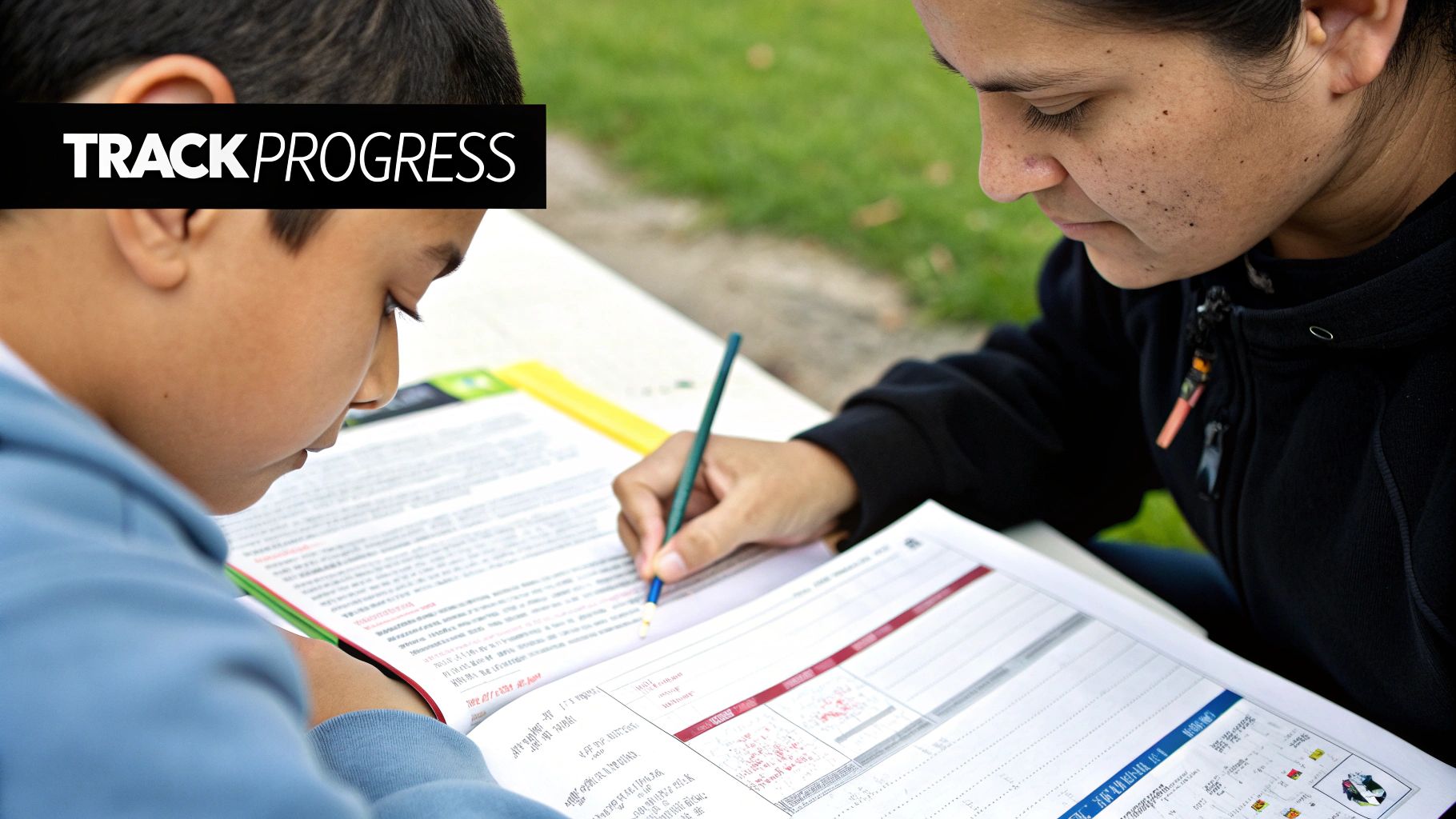
The thought of GCSEs and A-Levels can feel like a huge question mark hovering over your home education journey. It’s natural to worry whether this different path might close doors to future opportunities. The good news? With a bit of forward planning, home-educated children can not only access formal qualifications but also build a compelling profile that universities and employers find incredibly attractive.
This journey empowers your child, building independence and self-motivation—qualities that are highly valued everywhere. You aren't just managing their education; you're helping them become the architects of their own future, giving them a sense of control and purpose.
Taking Control of Formal Qualifications
For families choosing a route that includes formal exams, the process is entirely manageable. Your child will need to be entered as a private candidate. This simply means you take on the responsibility of finding an exam centre and registering them for their chosen subjects.
This path requires organisation, but it puts your child firmly in the driver's seat. They aren’t bound by a school's timetable or limited subject options, free to study what truly interests them.
Practical Steps to Registering as a Private Candidate:
- Find a Centre Early: Start looking for schools or colleges that accept private candidates at least a year in advance. Major exam boards like AQA and Pearson have lists on their websites. This reduces last-minute stress.
- Understand the Costs: Fees can vary significantly, so it’s worth contacting several centres. You will pay for the exam entry itself, plus an administration fee to the centre for invigilation.
- Check the Specification: This is crucial for success and peace of mind. Make sure the curriculum you are following matches the exam board's exact specification for that subject. For example, if they're studying Macbeth for English Literature, ensure it's the right text for the exam board you've chosen.
Thriving Beyond the Traditional Path
Qualifications are just one part of the story. More and more, universities and employers are looking beyond exam results for evidence of passion, skill, and character. A flexible home education UK curriculum is perfectly positioned to showcase these qualities in ways a traditional school record cannot.
Your child's journey is their unique selling point. The self-discipline needed to study independently or the creativity shown in a personal project speaks volumes about their potential and their spirit.
Instead of just a list of grades, your child can present a rich portfolio that truly captures who they are and what they can do.
- Detailed Learning Portfolios: A portfolio can include project work, photos of creations, written pieces, or even a personal website showcasing their skills. For a child passionate about art, this is far more powerful than a single grade.
- Vocational Qualifications: Qualifications like BTECs offer practical, skills-based learning that can lead directly into specific careers or university courses, honouring their practical talents.
- Real-World Experience: Volunteering at an animal shelter, starting a small online business selling crafts, or completing work experience demonstrates an initiative and maturity that sets them apart from the crowd.
By embracing these alternatives, you show your child that their future isn't defined by a single set of exams, but by the sum of their passions, experiences, and unique talents.
Your Top Home Education Questions, Answered
Taking the leap into home education is an exciting time, but it's completely normal to have questions and a few wobbles along the way. That feeling of uncertainty is just part of the process, but getting clear, reassuring answers can give you the confidence you need, reaffirming that you’re making a wonderful choice for your family.
Here, we've gathered some of the most common questions we hear from parents. Our aim is to give you direct, heartfelt answers that keep your child’s needs front and centre, helping you move forward with clarity and peace of mind.
Do I Need to Be a Qualified Teacher to Home Educate?
This is often the first and biggest hurdle for parents, but let's clear this up straight away: the answer is a resounding no. You do not need any formal teaching qualifications. What the law actually requires is that you provide an education that is ‘suitable’ for your child's age, ability, and aptitude.
Think about it this way: your most powerful qualifications are your deep, intuitive knowledge of your child, your passion for their wellbeing, and your commitment to their growth. You have always been their first and best teacher. You know what makes them light up and what makes them shut down. That is more than enough.
How Much Does It Cost to Home Educate in the UK?
The cost of a home education UK curriculum can vary dramatically. It could be next to nothing, or it could run into thousands of pounds a year. It all depends on the path you choose, and there is absolutely no right or wrong answer here. Your budget does not define the quality of your child's education.
You can create a wonderfully rich learning environment using incredible free resources.
- Your local library: A genuine treasure trove of books, audiobooks, and often, free community events and workshops. It’s a warm, welcoming space for discovery.
- Online platforms: Websites like BBC Bitesize and Khan Academy offer brilliant, structured learning materials at no cost.
- The great outdoors: Nature offers an endless supply of lessons in science, art, and wellbeing, and it doesn't cost a penny. A walk in the woods can soothe an anxious mind and spark a hundred questions.
Many families find a happy medium. They might invest in a specific online course for a subject their child is passionate about while using free resources for everything else.
The most valuable resource in your home education journey isn't money; it's your time, your creativity, and your connection with your child. A walk in the woods together can be far more enriching than the most expensive curriculum.
How Can I Ensure My Child Is Learning Enough?
One of the most liberating parts of home education is letting go of the school-based idea of progress—the endless cycle of standardised tests, grades, and formal reports that can cause so much stress. Instead of chasing test scores, you get to witness genuine, meaningful learning in real-time.
Look for the signs of progress that truly matter: their growing curiosity, the thoughtful questions they start asking, their increasing confidence, and the pure excitement on their face when they finally master a new skill they've been working on. You can document their journey through photos of projects, a journal of the books you’ve read together, or just simple notes from your conversations. This creates a rich, authentic record of their development that tells a far more compelling and beautiful story than any exam result ever could.
At Queens Online School, we understand that every child's educational journey is unique. We offer a structured yet flexible online British curriculum that supports families by combining live, interactive classes with expert teachers, creating a personalised path to success. If you're looking for a supportive framework that honours your child's individual needs while providing a clear route to recognised qualifications, discover how we can help.




